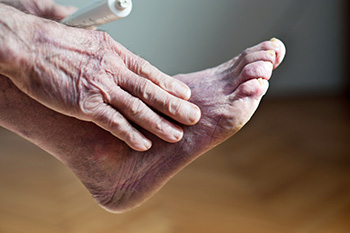
(616) 846-3400
Fax: (616) 846-3406

(616) 846-3400
Fax: (616) 846-3406

Poor foot circulation can silently wreak havoc on your health, manifesting in various troubling symptoms. One of the most common indicators is cold feet, often accompanied by numbness or tingling sensations. Swelling in the feet and ankles, particularly after prolonged periods of sitting or standing, may also signify compromised circulation. Additionally, you may notice changes in skin color, with the feet appearing pale or bluish. These symptoms can interfere with daily activities and diminish your quality of life. Several factors contribute to poor foot circulation, including underlying health conditions such as peripheral artery disease, diabetes, or hypertension. Lifestyle choices, like smoking, a sedentary lifestyle, and a diet high in saturated fats, can worsen poor circulation. Furthermore, obesity and certain medications may also impair circulation. If you are experiencing any of the above symptoms, it is suggested that you are under the care of a podiatrist who can help you to manage this condition.
While poor circulation itself isn’t a condition; it is a symptom of another underlying health condition you may have. If you have any concerns with poor circulation in your feet contact Dr. Robbi Young of Grand Haven Foot & Ankle. Our doctor will treat your foot and ankle needs.
Poor Circulation in the Feet
Peripheral artery disease (PAD) can potentially lead to poor circulation in the lower extremities. PAD is a condition that causes the blood vessels and arteries to narrow. In a linked condition called atherosclerosis, the arteries stiffen up due to a buildup of plaque in the arteries and blood vessels. These two conditions can cause a decrease in the amount of blood that flows to your extremities, therefore resulting in pain.
Symptoms
Some of the most common symptoms of poor circulation are:
Treatment for poor circulation often depends on the underlying condition that causes it. Methods for treatment may include insulin for diabetes, special exercise programs, surgery for varicose veins, or compression socks for swollen legs.
As always, see a podiatrist as he or she will assist in finding a regimen that suits you. A podiatrist can also prescribe you any needed medication.
If you have any questions, please feel free to contact our office located in Grand Haven, MI . We offer the newest diagnostic and treatment technologies for all your foot care needs.